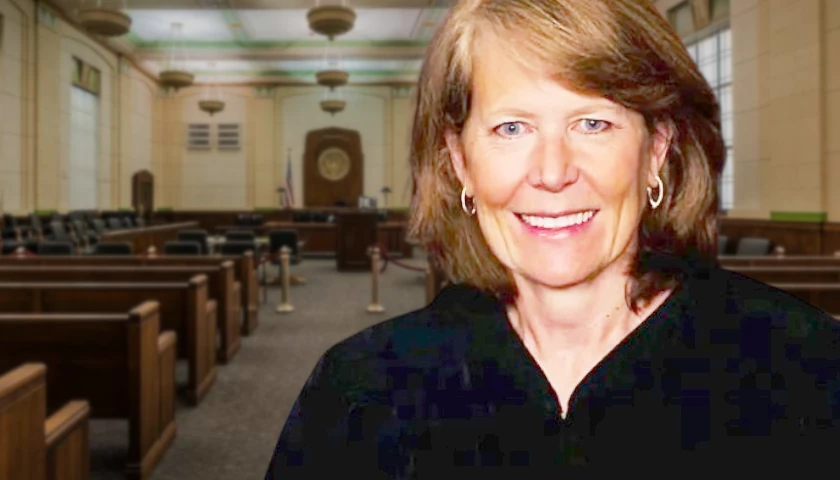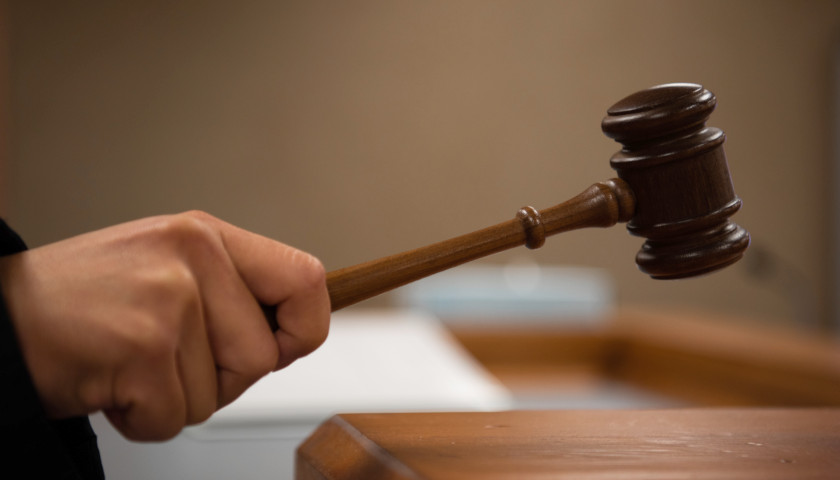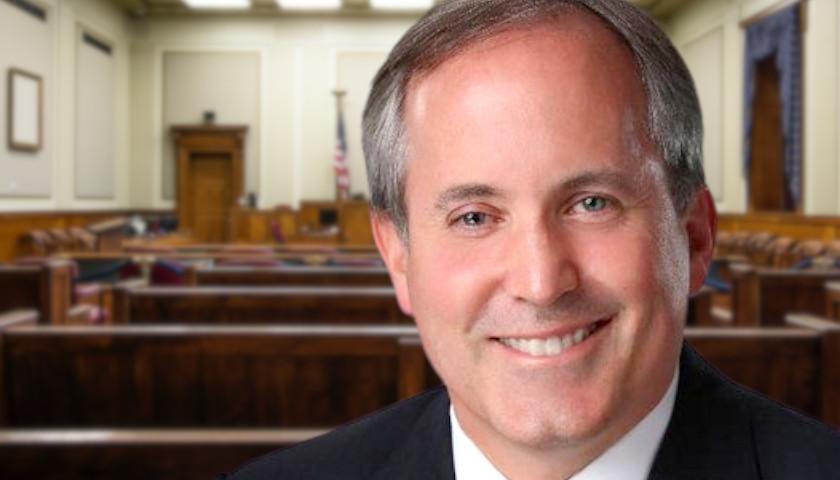A disciplinary panel for the State Bar of Arizona (SBA) dismissed complaints filed against two of Kari Lake’s attorneys that were brought over their work representing Kari Lake in a 2022 lawsuit, Lake v. Hobbs, challenging the use of voting machine tabulators in elections. The panel of three, led by Presiding Disciplinary Judge Margaret Downie (pictured above), found that the SBA did not prove by clear and convincing evidence that Kurt Olsen — who represented himself and isn’t a licensed member of the SBA — and Andrew Parker violated any ethics rules. The decision cited a recent opinion from the Arizona Supreme Court, Ariz. Republican Party v. Richer, which held that attorneys should not be sanctioned for bringing election lawsuits.
U.S. District Court Judge John Tuchi, who was appointed to the bench by former President Barack Obama, ordered sanctions of $122,200 against Olsen, Parker, and attorney Alan Dershowitz over a year ago for bringing the lawsuit. The sanctions were requested by the Maricopa County Board of Supervisors, who were represented by Maricopa County Attorney Rachel Mitchell. The Maricopa County Republican Committee censured Mitchell over the representation.
Judges have not sanctioned attorneys in similar cases to the lawsuit brought by Lake and Finchem challenging voting machine tabulators.
The panel noted that the sanctions are currently being appealed and said, “The hearing panel does not rely on the District Court’s sanctions decision in reaching its conclusions.”
After the sanctions were issued, bar complaints were filed against Olsen and Parker. The 65 Project, which files bar complaints against conservative election attorneys, previously filed complaints against Olsen and Parker over the lawsuit. After the complaints were filed, the SBA found probable cause last December and filed charges in January.
The SBA accused the pair of violating the usual broad, vague, and arguably unconstitutional ethics rules used to target conservative attorneys. The panel described them as “ER 1.1 (competence), ER 1.3 (diligence), ER 3.1 (meritorious claims and contentions), ER 8.4(c) (conduct involving dishonesty, fraud, deceit, or misrepresentation), and ER 8.4(d) (conduct prejudicial to the administration of justice).”
Citing the Ninth Circuit Court of Appeals case Cf. Golden Eagle Distributing Corp. v. Burroughs Corp, the panel reasoned, “The State Bar offers no authority for the proposition that, to comport with ethical requirements and/or applicable rules of civil procedure, a Complaint must set forth not only the plaintiff’s claims and theories, but also information that arguably undercuts or contradicts those claims and theories.” The panel quoted the case, “It is not the nature of our adversary system to require lawyers to demonstrate to the court that they have exhausted every theory, both for and against their client.”
The panel noted that Olsen and Parker relied on similar litigation in their arguments, the Georgia case Curling v. Raffensperger, which also challenged the use of voting machine tabulators. The SBA claimed that the two should not have cited that case since the facts weren’t the same. However, the panel counterargued, “Lawyers are not ethically prohibited from citing and relying on cases or authorities that are distinguishable in some respects.”
The panel observed that the pair’s experts, Benjamin Cotton and Clay Parikh, testified at the hearing that “Arizona’s voting systems were susceptible to the same infirmities identified in Curling,” and the “State Bar provided no controverting evidence.”
The SBA relied on a special master’s conclusion that the voting systems couldn’t be connected to the internet, but the panel said his “conclusions were not binding legal authority in Lake v. Hobbs.”
Next, the panel discussed the SBA’s accusation that the attorneys brought a case without standing since Tuchi and the appeals court dismissed the lawsuit based on standing. The panel noted that the attorneys presented evidence during the disciplinary proceedings to support their position that they did have standing — even though they were not required to. Parker had extensive experience on standing issues, the panel said, and their expert testified that they had standing.
The panel cited Ariz. Republican Party v. Richer, “lawyers are not subject to sanctions for asserting unsuccessful legal arguments that are ‘fairly debatable’ or ‘long shots.’”
The SBA’s argument that the attorneys committed misconduct in their language regarding testing voting machines was shot down by the panel, since they “had a good faith basis for including the challenged statements.” Similarly, the panel found that the pair did not act improperly by requesting an injunction halting the use of the machines, even if a long shot.
The panel said the Arizona Supreme Court — which would be the next court to hear an appeal from the disciplinary court — would adhere to its ruling in Ariz. Republican Party v. Richer, where it stated that a claim “may lack winning merit without being sufficiently devoid of rational support to render it groundless.”
The remaining accusations were also dismissed, including allegations of incompetency and failure to “act with reasonable diligence and promptness in representing a client.” Nor was there any merit found to the assertion that the attorneys brought a frivolous claim. The panel stated, “An action is not frivolous, ‘even though the lawyer believes that the client’s position ultimately will not prevail.’”
Additionally, the panel pointed out that the SBA offered no witnesses to testify that it was, whereas Olsen and Parker “offered substantial testimony — both from themselves and others — demonstrating that they had a good faith, nonfrivolous basis in law and fact for making the challenged statements and allegations.”
The opinion concluded, “Retrospective scrutiny of any complex litigation may reveal some measure of imprecision, legal arguments fairly characterized as long shots, puffery in advocacy, and reliance on authorities that are distinguishable in some respects.”
In April, the Arizona Republican Party and two other state Republican parties filed an Amicus Curiae brief in Lake v. Hobbs supporting a Petition for Certiorari Lake and Finchem filed with the U.S. Supreme Court. The brief went over how new evidence was discovered after the lower courts dismissed the case.
Another one of Lake’s attorneys, Bryan Blehm, was suspended for 60 days earlier this year for his election lawsuits due to stating in a pleading that 35,563 ballots were inserted into the 2022 election. The ballots in question lacked a chain of custody, which is a class 2 misdemeanor. Unlike Olsen and Parker, he was not provided with a full hearing.
Downie was previously appointed to the Arizona Court of Appeals by Democratic Governor Janet Napolitano. The SBA has been criticized for targeting conservative attorneys.
– – –
Rachel Alexander is a reporter at the Arizona Sun Times and The Star News Network. Follow Rachel on X/Twitter. Email tips to [email protected].





